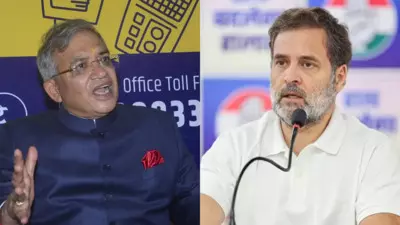The Allegations of Election Rigging: Dissecting Claims and Responses

In the bustling world of Indian politics, allegations and counter-allegations often dominate the headlines. Recently, a storm brewed over the Maharashtra Assembly elections held in November 2024. Congress leader Rahul Gandhi raised serious concerns, claiming that the elections were marred by rigging, or as he put it, 'match-fixing'. This has led to a heated exchange between the Congress party and the Election Commission of India (ECI). But what exactly are these allegations, and how has the Election Commission responded?
Understanding the Allegations
Gandhi's op-ed published in The Indian Express outlined a series of claims regarding the electoral process in Maharashtra. He alleged that the electoral rolls were manipulated with fake voters, voter turnout was inflated, and there were instances of targeted bogus voting. Moreover, he expressed his fears that similar tactics could be employed in the upcoming Bihar Assembly elections. With the Congress party, along with its allies, suffering a significant defeat—winning only 46 out of 288 seats compared to the BJP's 132—the frustrations were palpable.
The Election Commission's Response
The ECI did not take these allegations lightly. In a detailed rebuttal, the Commission stated that no serious complaints were made by Congress representatives during the elections. They emphasized that every polling booth was monitored by agents appointed by all participating parties, including the Congress. Furthermore, they pointed out that out of nearly 10 crore electors, only 89 appeals were raised regarding the electoral rolls, indicating minimal grievances from any party about the voting process. This response has sparked discussions about the validity of the allegations raised by the Congress party.
The Importance of Transparency in Elections
Election integrity is the backbone of any democracy. When allegations of rigging arise, they can undermine public trust in the electoral process. The ECI reiterated that Indian elections are conducted according to strict legal frameworks and have been lauded for their scale and accuracy worldwide. They argued that unfounded claims not only discredit the election process but also demoralize the election staff who work tirelessly to ensure a fair voting experience.
The Political Fallout
As the dust settles, one cannot overlook the political implications of these allegations. This back-and-forth between the Congress and the Election Commission reflects the intense competition and high stakes involved in Indian elections. It's essential for political parties to address their grievances through proper channels rather than making broad allegations that might mislead the public.
What Lies Ahead?
As we move closer to the Bihar Assembly elections, the political landscape is likely to become even more charged. If the Congress party continues to raise these allegations without substantial evidence, it may face backlash not just from the ruling party but also from the electorate who may see these actions as politically motivated attempts to deflect scrutiny from their own performance. It will be interesting to see how the ECI and political parties navigate this complex situation in the upcoming elections.
In conclusion, the Maharashtra Assembly elections have reopened the debate on electoral integrity in India. While allegations of rigging can be damaging, it's crucial that these claims are substantiated with evidence to maintain the sanctity of the electoral process. As citizens, we must remain vigilant and demand transparency from our political leaders and institutions.
